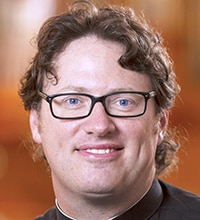
What they wondered about was whether Jesus would again heal on the Sabbath. That’s what drew the ire of so many each time he did it — and he healed on the Sabbath a lot. What made it worse was his excuse for doing so. “My Father is at work … so I am at work,” Jesus said; he was equating himself with the Holy One of Israel, with the only one who could get away with working on the Sabbath.
But by this time, though, maybe Jesus was tired of that controversy. Because he just heals the poor man suffering from dropsy, sends him away and simply silences his critics by saying, basically, that love means healing even on the Sabbath, no matter if it’s your son or your ox. To Jesus’ words, Luke tells us, “they kept silent” (Lk 14:3-6). Perhaps that’s because they had all been at this impasse before and there was nothing else to say, no agreement to be reached. Jesus was a healing Sabbath rebel, and that’s all there was to it; all that could be done would be done in Jerusalem. The argument was coming to an end. The Passion was beginning.
| August 28 – 22nd Sunday in Ordinary Time |
|---|
|
Sir 3:17-18, 20, 28-29 |
But as I suggested, Jesus seems interested in something else, something deeper than squabbling about ritual law. He’s interested more in spiritual vision, priorities and spiritual imagination, which is what this parable is all about. This parable about how to behave at a wedding — do not seek the higher position, but the lower one — is not just a common sense lesson about etiquette and humility; rather, it’s a parable about the sort of values, the sort of vision, that constitute the kingdom of God. Mary sang of it: “He has thrown down the rulers from their thrones but lifted up the lowly” (Lk 1:52). That’s what the kingdom of God brings about, that’s what the kingdom is. This is the kingdom of the God who loves little Israel, who loves the widow and the orphan, the anawim. Those we think important — not as important. Those we think blessed — maybe not. Those we think powerful — just wait. That’s the revolutionary promise of the kingdom. Everything we value is flipped upside down. At the center of the Gospel is a gruesome death we claim is actually the revelation of God; a crucified peasant we call the Lord (cf. Jn 8:28; Phil 2:5-11). That’s the sort of vision those seeking the kingdom should adopt.
And that’s the question: whether we’re comfortable with that. “Rather, when you hold a banquet, invite the poor, the crippled, the lame, the blind” (Lk 14:13). Would you go to a banquet like that, or would you look for a better invitation? Those the kingdom prizes are not powerful, not wealthy, not the elite, not those the world normally praises and prefers. That’s the lesson; and the questions, of course, are these: Are you cool with that? Does that make you uncomfortable? Do you live your life according to these strange kingdom of God values? These are the sorts of questions that make us squirm a little, questions also that let us know we’re listening — growing, too. Which is good! So, let’s squirm and grow in grace together!
Father Joshua J. Whitfield is pastor of St. Rita Catholic Community in Dallas and author of “The Crisis of Bad Preaching” (Ave Maria Press, $17.95) and other books.





